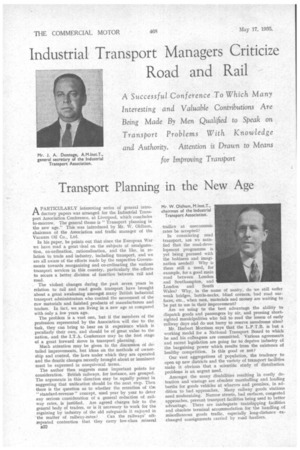Industrial Transport Managers Criticize Road and Rail
Page 32

If you've noticed an error in this article please click here to report it so we can fix it.
Transport Planning in the New Age
A PARTICULARLY interesting series of general intro
ductory papers was arranged for the Industrial Transport Association Conference, at Liverpool, which concludes to-morrow. The general theme is " Transport planning in the new age." This was introduced by Mr. W. Oldham, chairman of the Association and traffic manager of the Vacuum Oil Co., Ltd.
In his paper, he points out that since the European War we have read a great deal on the subjects of amalgamation, co-ordination, rationalization, and the like, in relation to trade and industry, including transport, and we are all aware of the efforts made by the respective Governments towards reorganizing and co-ordinating the various transport services in this country, particularly theefforts to secure a better division of function between rail and road.
. The violent changes during the past seven years in relation to rail and road goods transport have brought about a great awakening amongst many British industrial transport administrators who control the movement of the raw materials and finished products of manufacturers and traders. In fact, we are living in a new age as compared with only a few years ago.
The problem is a vast one, but if the members of the profession represented by the Association will rise to the task, they can bring to bear on it experience which is peculiarly their own, and should be of great value to the nation, and the I.T.A. Conference may be the first stage of a great forward Move in transport planning.
Much attention may be given to the discussion of detailed improvements, but ideas on the methods of ownership and control, the laws under which they are operated and the drastic changes recently brought about or imminent must be expressed in unequivocal terms.
The author then suggests some important points for consideration. British railways, for instance, are grouped. The arguments in this direction may be equally potent in suggesting that unification should be the next step. Then there is the question as to whether the retention of tire " standard-revenue" concept, used year by year to deter any serious consideration of a general reduction of railway rates, is justified. Are agreed charges fair to the general body of traders, or is it necessary to work for the regaining by industry of the old safeguards it enjoyed in
the matter of railway-rates? Can the railways' oftrepeated contention that they carry low-class mineral n22
Mr. W. Oldham, M.Inst.T., chairman of the Industrial Transport Association.
traffics at uneconomic rates be accepted?
In considering road transport, 'are we satisfied that the road-development programme is yet being pursued with the boldness and imagination needed? Why is there still a need, for example, for a good main road between London and Southampton, and London and South Wales? Why, in the name of sanity, do we still suffer weak bridges, bottle-necks, blind corners, bad road surfaces, etc., when men, materials and money are waiting to be put to use in their improvement?
Are we using to the best advantage the ability to dispatch goods and passengers by air, and pressing shortsighted municipalities who fail to read the lesson of early railway days and do not hurry to reserve aerodrome sites?
Mr. Herbert Morrison says that the L.P.T.B. is but a working model for a National Transport Board to which. he and his colleagues are committed. Various agreements and recent legislation are going far to deprive industry of the bargaining power which results from the existence of healthy competition. Is this good or not?
Our vast aggregations of population, the tendency to open up new districts and the variety of transport facilities make it obvious that a scientific study of distribution problems is an urgent need. Amongst the many disabilities resulting in costly detention and wastage are obsolete marshalling and loading berths for goods vehicles at wharves and premises, in addition to bad approaches. Many railway goods stations need modernizing. Narrow streets, bad surfaces, congested approaches, prevent transport facilities being used to better advantage. There are inadequate transhipping facilities and obsolete terminal accommodation for the handling of miscellaneous goods traffic, especially long-distance exchanged consignments carried by road hauliers.






















































































